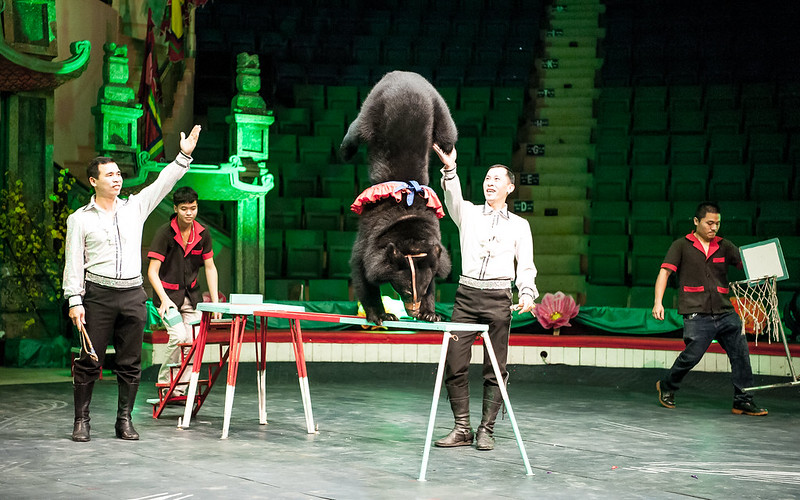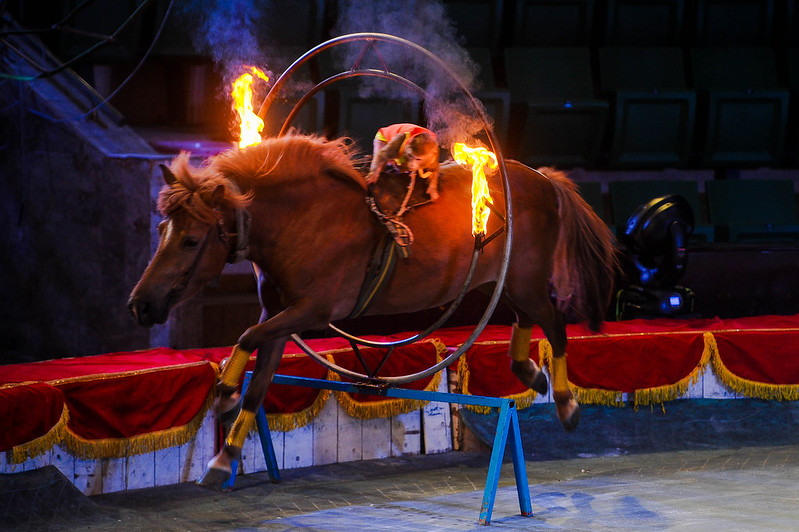PETITION: Net is closing on animal performance as calls for ban intensify
06 July 2018
With accusations of wildlife crime yet to be answered, calls for an animal performance ban in Vietnam grow louder.
When Animals Asia released its report into animal performance in Vietnam last month, the country was shocked.
Findings show hundreds of animals from 19 species, six of which are protected in Vietnam, are abused at facilities up and down the country. Not one facility was able to meet the animals’ basic needs.
Already one theme park has been forced by the authorities to suspend animal performances while they investigate allegations of wildlife crime.
That investigation is still under way and its outcome could decide the future of wild animal performance in the country.
While the circuses have tried to defend their record on welfare and the origin of their protected species, not one facility has been able to explain how they obtained protected animals such as moon bears, elephants, orangutans, macaques, pythons and crocodiles.
Nearly one month on from the release of the report here is how the country views the stand off:
Media and the public agree with a ban

Since Animals Asia’s report into animal abuse at circuses was released, the Vietnamese media has made the issue a hot talking point.
The report was covered in over 80 articles in more than 53 separate news outlets in just a few weeks.
Notably, the majority of coverage and public opinion seems to oppose animal performance.
One newspaper quoted a reader saying:
“I used to take my kids to see animal circus performances, but not anymore. If you have the chance to go backstage, you will see the terrible conditions these animals are living in. This (the circus) both physically and mentally damages these animals”.
Khuat Thu Hong, Director of the Institute for Social Development Studies, reportedly asked parents not to take their kids to such shows, because it was not the animals’ natural instinct to mimic human behaviour.
“After seeing wild animal circus performances, kids will think they can do whatever they want to them,” Hong said.
An opinion piece in the state-run Vietnam News titled “Respect the lives of animals” concluded:
“There is a lot to do in a developing country like ours regarding animal protection, and this will take a long time. But whatever we choose to do, in my opinion, it’s best that we bear in mind that every creature on the planet deserves to live its life free from suffering and exploitation. If we can’t provide animals with ideal living conditions, then at least we should stop using them as a means of entertainment.”
Facilities and federations are beginning to move away from wild animal performance
In recent years, five facilities in Vietnam have ended animal performances. In 2014, Hanoi Zoo stopped shows after a period of collaboration with Animals Asia, while the UNESCO-accredited Can Gio Biosphere finally ended a cruel monkey circus in April 2018 after a sustained Animals Asia campaign signed by more than 43,000 people.
Other facilities to realise that animal cruelty isn’t a good business model include the Buddhist theme park Suoi Tien and the Dai Nam tourism resort.
Following the release of Animals Asia’s exposé into suspected wildlife crime at circuses up and down the country, the Vietnam Circus Federation has already declared they will move away from using wild animals in their circuses in the future.
Clearly, the net is tightening on facilities and many are realising cruelty doesn’t have to be the future.
Over 15,000 people around the world are demanding change
In just a few weeks, more than 15,000 compassionate people and counting have signed Animals Asia’s petition calling on the Vietnam government to ban wild animal performance.
This expression of public opinion can help keep the pressure on during the investigation into suspected wildlife crime by reminding the authorities the world is watching.
Vietnam is at a crossroads. It can choose to join the growing community of over 50 countries with bans that secure a harmonious future for people and animals, or it can continue with an outdated mode of entertainment which is dangerous for spectators, cruel to animals, encourages wildlife crime, misleads the public and damages the country’s reputation abroad.
Now is the time to call for change. Sign the petition asking the Vietnam government to end cruelty and wildlife crime by banning wild animal performances, and allowing the animals to be sent to sanctuaries and rescue centres.
BACK






